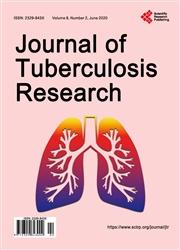Assessment of Factors Contributing to TB Treatment Adherence among Patients on TB Treatment in Kano State, Nigeria: A Case Study
引用次数: 1
Abstract
Background: The WHO recommended DOTS has been proven to be very effective in the treatment of tuberculosis (TB) patients. However, despite its effectiveness, non-adherence to the treatment regimen remains a major concern in TB management. This has great consequences which include persistent infectiousness, higher rates of treatment failure, continued transmission, drug resistance, and untimely death. The aim of this study is to examine the factors and behavioural patterns that contribute to treatment adherence among TB patients in Kano State, Nigeria. Methods: A qualitative study design which included two focus group discussions (FGDs) and four key informant interviews (KIIs) were adopted for this study. In total, 20 participants were interviewed comprising 16 focus group discussion participants (8 patients on treatment and 8 individuals who have been cured) divided into two groups and four key informant interviews with 4 health workers in the selected treatment facilities. Data analysis was done by translating and transcribing the responses from the FGDs and KIIs. The transcribed data was analysed using a thematic framework procedure. Results: It was observed that having a good treatment supporter who was effective and very supportive was the most important factor contributing to treatment adherence. Other identified factors that contributed to treatment adherence included: good communication by health personnel, social support from relatives and communities, little or no side effects from drug usage, low cost of transportation to the health facilities, a positive mind set towards drug usage and treatment, support and motivation from health workers, feelings of wellness during treatment, and a balanced diet. All the respondents agreed that treatment adherence had far reaching effects on positive treatment outcomes. Conclusion: For better treatment adherence, a competent treatment supporter should be available for TB patients. Health care workers should ensure that effective communication and a cordial relationship do exist with TB patients. Also, TB patients should be properly counselled before the commencement of their treatment regimen to help them maintain a positive mind-set towards treatment. Finally, TB interventions should provide adequate social support for patients.尼日利亚卡诺州结核病患者依从性因素评估:案例研究
背景:世界卫生组织推荐的DOTS已被证明在治疗结核病(TB)患者方面非常有效。然而,尽管有效,但不遵守治疗方案仍然是结核病管理中的一个主要问题。这会产生巨大的后果,包括持续的传染性、更高的治疗失败率、持续的传播、耐药性和过早死亡。本研究的目的是检验尼日利亚卡诺州结核病患者坚持治疗的因素和行为模式。方法:本研究采用定性研究设计,包括两次焦点小组讨论(FGD)和四次关键信息者访谈(KII)。总共采访了20名参与者,包括16名焦点小组讨论参与者(8名正在接受治疗的患者和8名已治愈的患者),分为两组,并对选定治疗机构的4名卫生工作者进行了4次关键线人访谈。通过翻译和转录FGD和KII的反应进行数据分析。转录的数据采用专题框架程序进行分析。结果:观察到,有一个有效且非常支持的良好治疗支持者是促进治疗依从性的最重要因素。其他已确定的有助于坚持治疗的因素包括:卫生人员的良好沟通、亲属和社区的社会支持、药物使用几乎没有副作用、前往卫生设施的交通成本低、对药物使用和治疗的积极心态、卫生工作者的支持和动力、治疗期间的健康感,以及均衡的饮食。所有受访者都认为,坚持治疗对积极的治疗结果有深远的影响。结论:为了更好地坚持治疗,结核病患者应该有一个合格的治疗支持者。卫生保健工作者应确保与结核病患者之间存在有效的沟通和友好的关系。此外,结核病患者在开始治疗方案之前应得到适当的咨询,以帮助他们保持积极的治疗心态。最后,结核病干预措施应为患者提供充分的社会支持。
本文章由计算机程序翻译,如有差异,请以英文原文为准。
求助全文
约1分钟内获得全文
求助全文

 求助内容:
求助内容: 应助结果提醒方式:
应助结果提醒方式:


